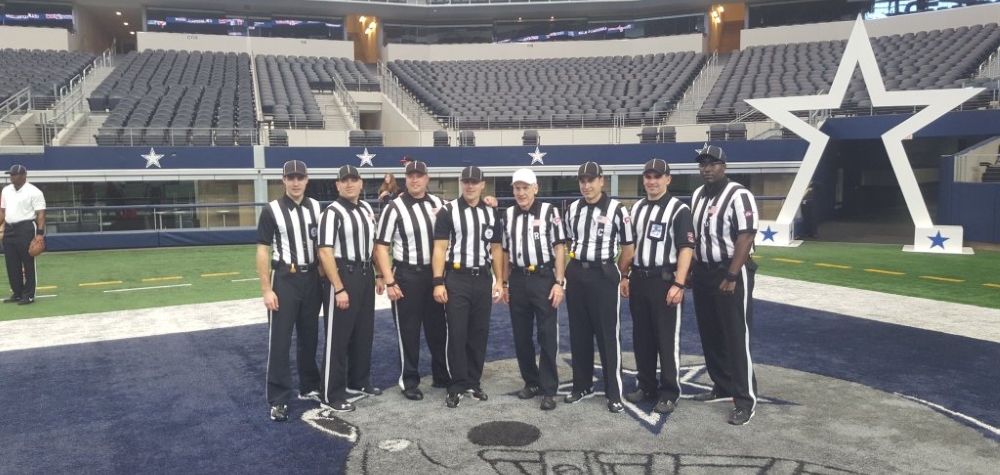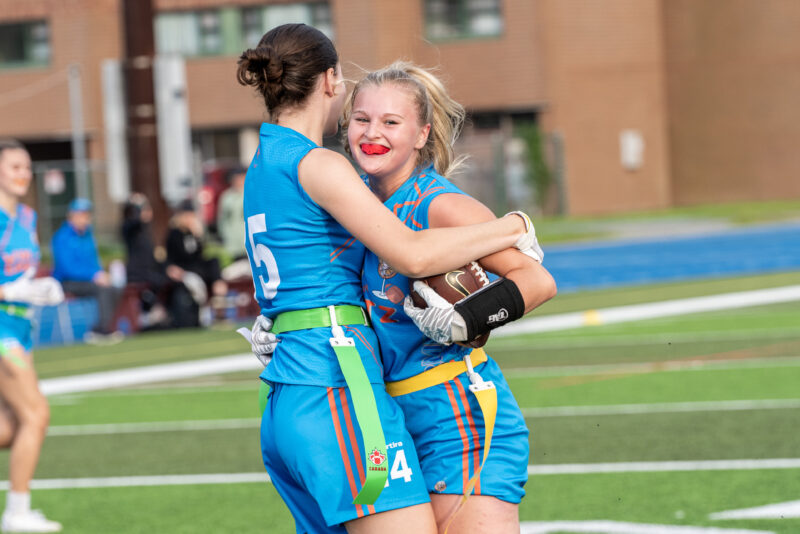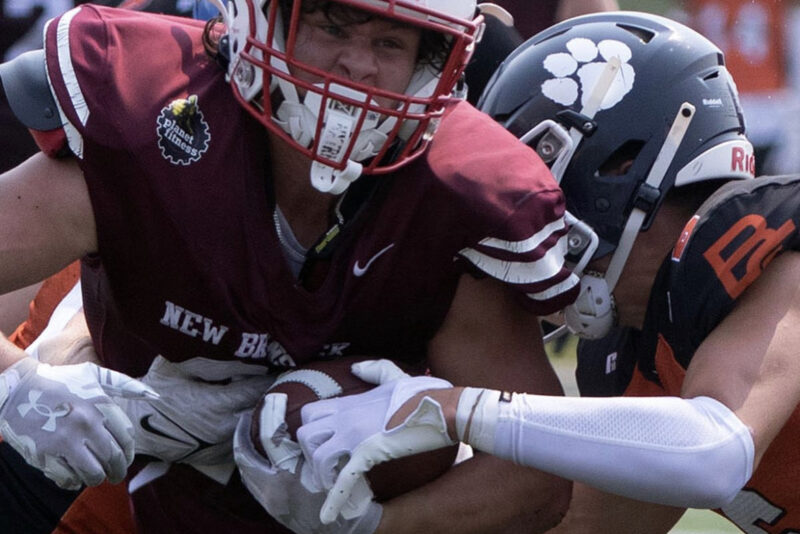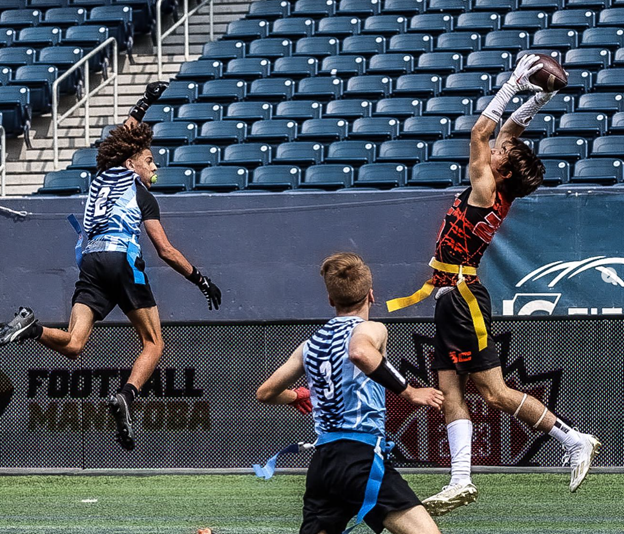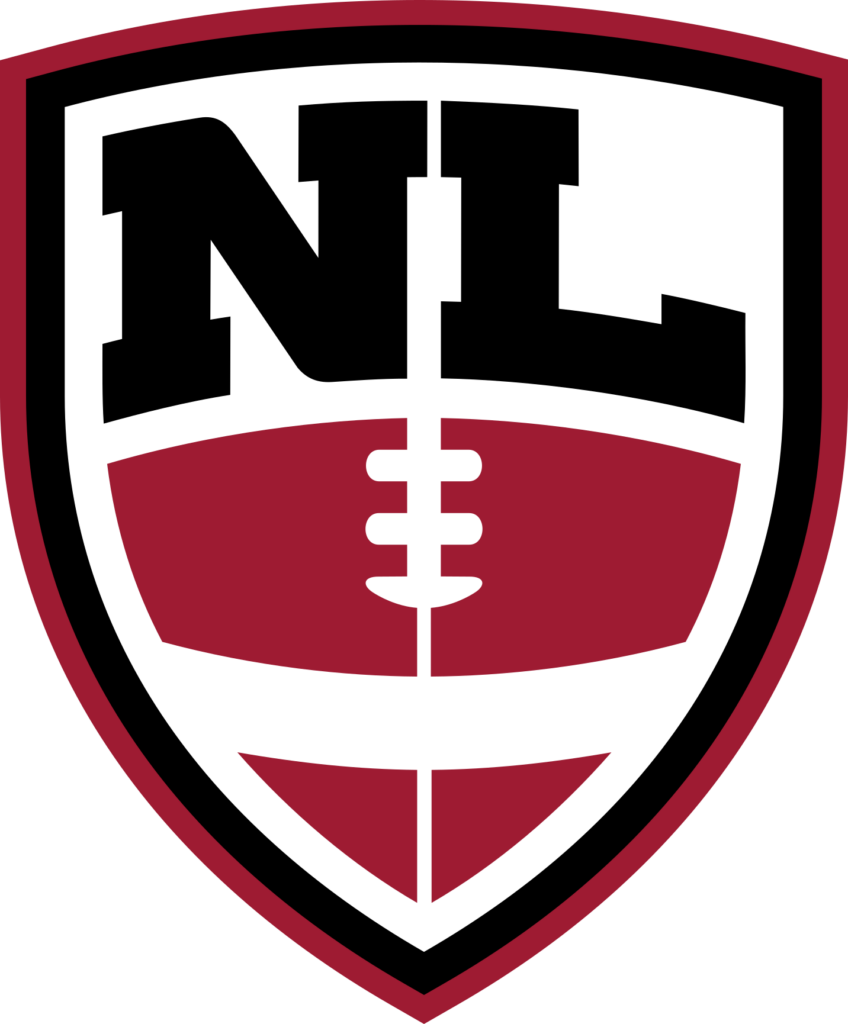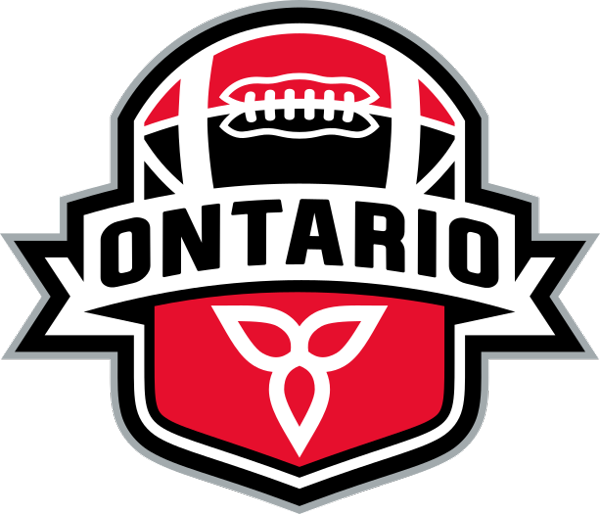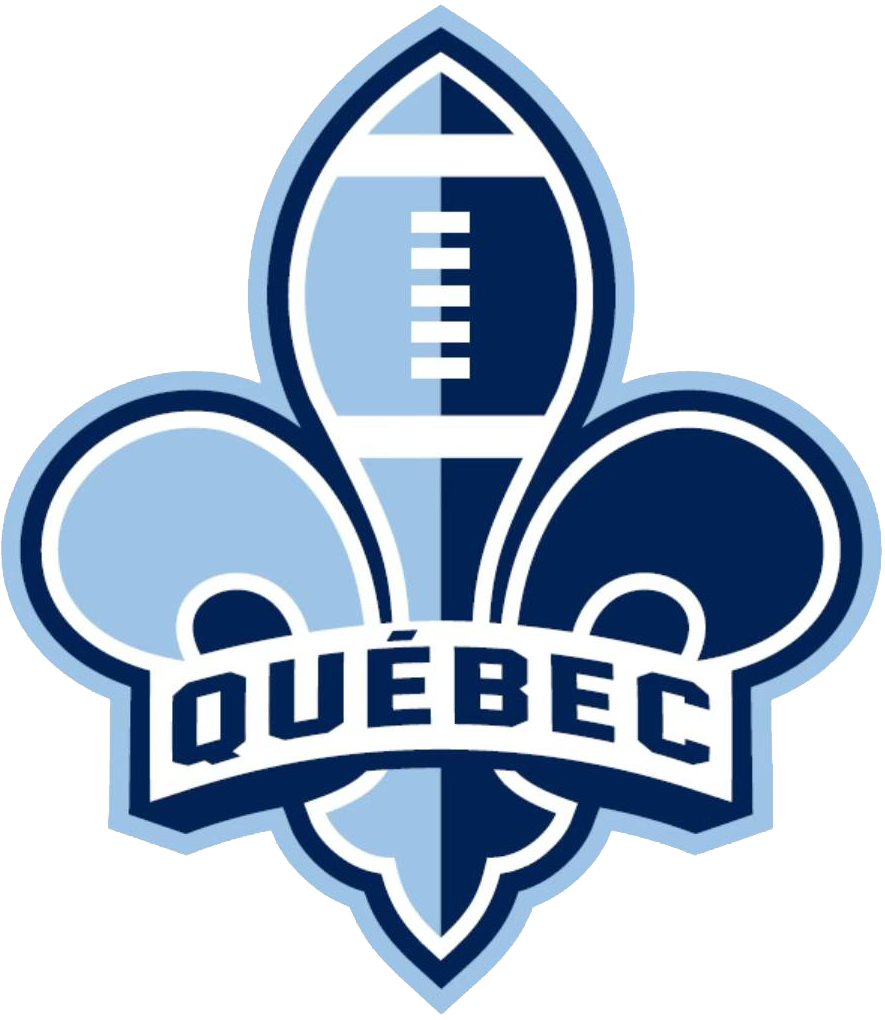Trio of Canadians officiate 2016 International Bowl
For the first time in International Bowl history, Canadians joined the officiating crew for the series of games between USA Football and Football Canada from January 31 – February 3. After impressing at the 2015 Football Canada Cup, Troy Semenchuk (Prince Albert, Sask.), Brandon Iwanyshyn (Edmonton, Alta.) and Laurent Dubreuil (Montreal, Que.) earned this opportunity of a lifetime.
Games took place at AT&T Stadium, home of the Dallas Cowboys – one of the largest and most recognizable symbols of Texas’ football mecca. Affectionately called “Jerry World” after Cowboys’ owner Jerry Jones, the venue is one of the most expensive sport stadiums ever built ($1.2 billion) and is a sight to behold. Sunlight beams onto the field of America’s team through retractable end zone glass walls which provide the allusion of playing outdoors. Below the stadium’s retractable roof are gigantic video screens, stretching from 20-yard line to 20-yard line on either side of the sideline.
Veteran official Bill LeMonnier has worked in some big games and stadiums including 17 post-season (NCAA) bowl games, highlighted by the 2010 BCS National Championship Game. He gave his fellow crew members some great advice prior to the U19 game’s kickoff which opened the action on January 31.
He said, “Make sure you take some time to look around and enjoy it,” Troy Semenchuk recalled.

“It’s so weird because during play you’re staying focused all the time but during a TV break or timeout, you have a second to take a look around,” Troy said. “It’s really something.”
The 2016 series marked the first time that Canadian officials were brought to the Lone Star State to call the International Bowl. All three were chosen from the crew that worked the gold medal game at the 2015 Football Canada Cup. Participation on the gold medal game’s officiating crew is typically an honour bestowed on the tournament’s top-rated officials. So, just like the players and coaches of Canada’s U18 national team, the three officials invited to Texas were picked as the tournament’s top performers.
The three felt pressure to make a good first impression for their Canadian counterparts.
“I think the one thing is you don’t want to be the reason why another Canadian official can’t go or another isn’t invited back,” said Edmonton based official, Brandon Iwanyshyn.
“For sure there’s pressure and by no means did we know the rulebook inside and out. Really focusing on the things that pertained to our different positions and calls we’re going to have and basic rules is important. There is a little pressure, we wanted to do a good job and we wanted others to get invited,” explained Prince Albert, Sask.’s Troy Semenchuk.
These level III Canadian officials were used to working high school, junior, university and senior football but never had to contend with a live ESPN TV crew, broadcasting the games around the world. To kick the pressure up a few more notches, the crew also contended with AT&T Stadium’s Texas sized jumbotron which broadcasted slow motion replays for all those in attendance to see.
“You never want to be that guy who’s going to screw up a call or screw up a team, especially with that jumbotron,” Montreal’s Laurent Dubreuil said. “They would show the replay and if you missed the call, everybody would see it. You don’t want to miss the call, especially when you’re not all that comfortable with the rules. You actually want to go unnoticed as a referee on the field.”
Having never called a 4-down football game before, the Canadian contingent prepared for the week ahead by attending an all-day clinic given by some U.S. college-level referees who went through all the mechanics and rules to bring them up to speed.
“It wasn’t even so much with moving from three to four downs, it’s the refereeing mechanics that were the big adjustment,” Troy Semenchuk said of the transition. “There’s eight on the field instead of seven. Responsibilities are similar but they have very different rules in terms of substitution and mechanics.”
The night before the first game day, the Canadians continued preparations for their international debut by picking the brain of LeMonnier.
“That night we did another session with Bill LeMonnier, he was really good and made us feel really comfortable,” Semenchuk recalled. “He went through some really specific stuff, position wise and rule wise.”
“We brought a bunch of questions to him and he answered them the best he could and gave us tips and tricks that we could use in the game,” added Montreal official Laurent Dubreuil. “We ended up having a 2-3 hour discussion with him, asking questions and discussing plays.”
The group credits their fellow officials and organizers assembled by USA Football with giving them the training and resources required to successfully transition to the international rules laid out in the IFAF rulebook. The group got up to speed by studying the American rules and mechanics before their trip which were flushed out through email and conference calls.
“This would have been maybe not as positive an experience if we weren’t prepared for it,” Troy explained. “Being prepared is the key, just like anything that you go to do. The rules and the mechanics are so different, being prepared is number one.”
The Canucks’ transition to the international game was also assisted by the game’s crew of supervisors and senior officials including one with a connection to the Canadian game. The group relied on one supervisor in particular, Tim Crowley, who’s resume not only includes over 30 years of Texas high school and college experience, but also as a CFL official when the league expanded into the U.S. during the 1990’s.
Not only did Crowley help bring along the Canadians by knowing their rulebook, but also made them feel at home.

“He was really proud about [his time in the CFL],” Troy said of Crowley. “If they were signing the anthem before our or another game, he’d be singing it, showing us that he knew the words. He really has fond memories of his CFL experience.”
As outsiders, the Canadian first timers were unsure of how they’d be greeted and perceived by their seasoned American crew members. Their hosts quickly put them at ease, welcoming them with open arms.
“Nobody looked down on us, they were all trying to help us,” explained Laurent.
“They were very happy to have us down here. Not just Tim, but all the other evaluators and all the guys we worked with were good, really good to us,” said Troy.
Not only do tournaments like the Canada Cup or International Bowl feature elite competitors playing for provincial and national pride but the condensed schedule (2-3 game days over a week, featuring multiple games), presents a great learning opportunity for officials.
“If you have the evaluators there and you learn something in your first game, you can apply that right away while it’s fresh in your mind,” explained Brandon. “You’re just thinking that on this play, I’ve got to work on this. Then most of the time if you do that well, you’re evaluator comes back and gives you positive feedback. That boosts your confidence.”
“You can always learn stuff from games, but then you come to a place like this and the things you learn are a lot more eye opening,” continued Brandon.
“I remember the first half of that first game – I had so many things going on in my mind. Then you eventually settle down and you start feeling really comfortable. You start doing things in a different way – you see the advantages and disadvantages of doing those mechanics and look at things that way. What you take from the experience is ultimately up to you, but I think it makes you a much better official.”
After the opening kickoff, the Canadian crew members detected a few subtleties when officiating north of the border.
One of the big differences was that Canadian officials try to establish their presence more at the end of a play’s action than their counterparts.
“We get in a lot at the end of each play to make sure we have a presence there,” explained Laurent.
“We had the supervisor come down and talk to us,” said Brandon. “The first thing he said when he came down there was, ‘I don’t normally come down until halftime but I thought you guys were going to get killed down there!’”
“That’s completely different for us, we like to run in and be involved with everything.”
A major rule difference between 3 and 4 down football is the introduction of the fair catch rule. Just like the Canadian players, the import officials also had to retrain themselves on special teams.
“Even if it wasn’t us taking care of the returner, it was still a big adjustment and sometimes we had to think about it – do we let the play go? That was probably for me, the toughest.” explained Laurent.
After shaking out the off-season rust, the Canadian contingent showed they belonged.
“Lots of them (U.S. officials) were surprised that we maybe did as well as we did,” Troy said. “It was pretty successful, I mean there’s little glitches here and there but for the most part, we walked away from the game saying that we were just a regular member of the team or of their crew and did a good job.”
The three Canadian officials aim to leverage their newfound international experience as they work towards higher levels like the CFL.
“It’s kind of like a resume,” Troy explained. “You have an officiating resume and the more experience you have on it, it shows that you’ve had different chances to learn and grow as an official.”
After a successful introduction, the trio also hope to work at future 4-down contests.
“We were talking with Bill LeMonnier and he was trying to bring some Canadian officials to the IFAF world championship in the future,” Laurent Dubreuil recalled. “We all looked at each other like were in for that! It would be a dream for us to referee games like that.”
At a future worlds, the officiating crew might contain members from across the globe just as Canadians Barclay Easton (Ottawa, Ont.) and Shawn Kerr (Calgary, Alta.) experienced when they participated on the officiating crew at the 2011 IFAF Senior World Championship in Austria.
“Language would be something that you’d have to work at,” Troy said of the possibility. “It would be really cool, you’d learn so much. It’s crazy the opportunities that are out there.”
For the time being, the three Canadians return to their local communities with plenty of memories to share. Football continues to grow across the globe and with it so do the opportunities for officials. Opportunities like the International Bowl serve as a catalyst for Canadian officials striving to enter the global fold.
“Just knowing that that opportunity’s out there, makes you want to strive and like I’ve said, this and Canada Cup have been fantastic experiences,” said Brandon. “Sharing it with the people back home – they just love the stories. It makes them want to push themselves to get there as well.”
“One of the things that I took away from this is just open yourself up to opportunities and take them when you can,” said Brandon. “Even for us at the Canada Cup, we just kind of put your name in, you didn’t really think too much of it, but as soon as that opportunity comes up, you’ve got to take it!”
Last July, Troy Semenchuk, Brandon Iwanyshyn or Laurent Dubreuil found themselves calling the 2015 Canada Cup in St-Jean with dreams of working a Vanier Cup or CFL game, but after their experience in Dallas, this July they might find themselves at the IFAF U19 World Championship in China.

